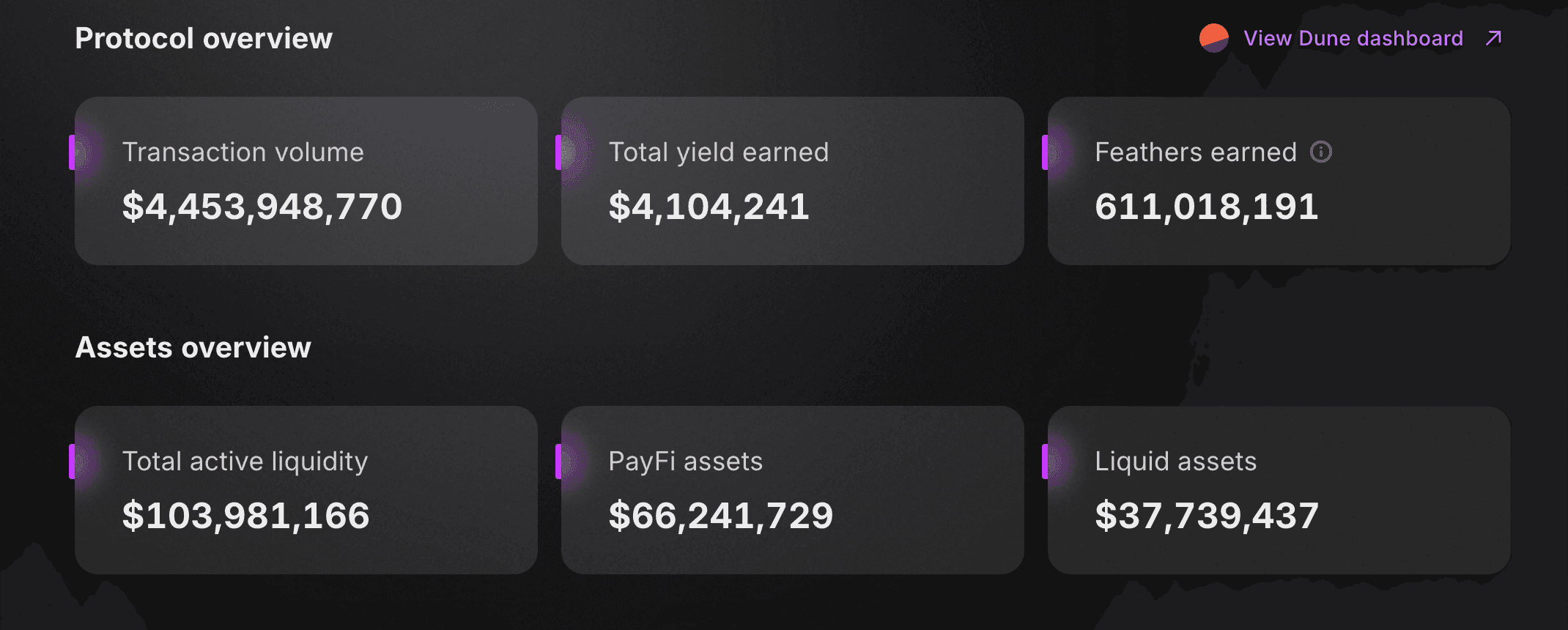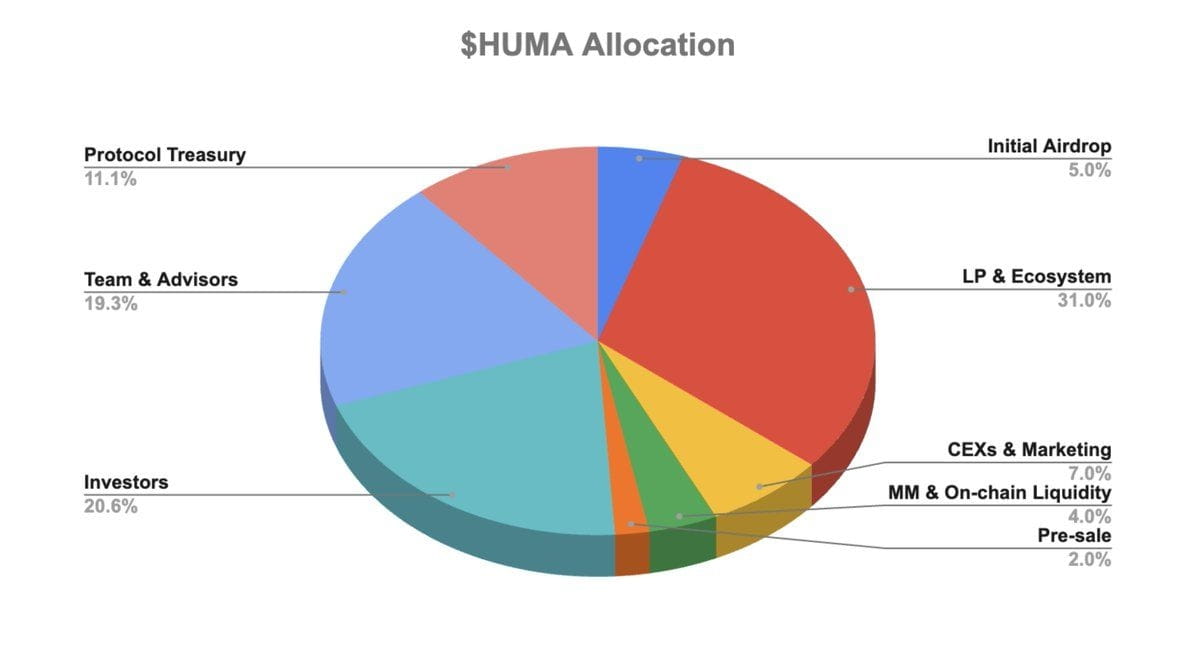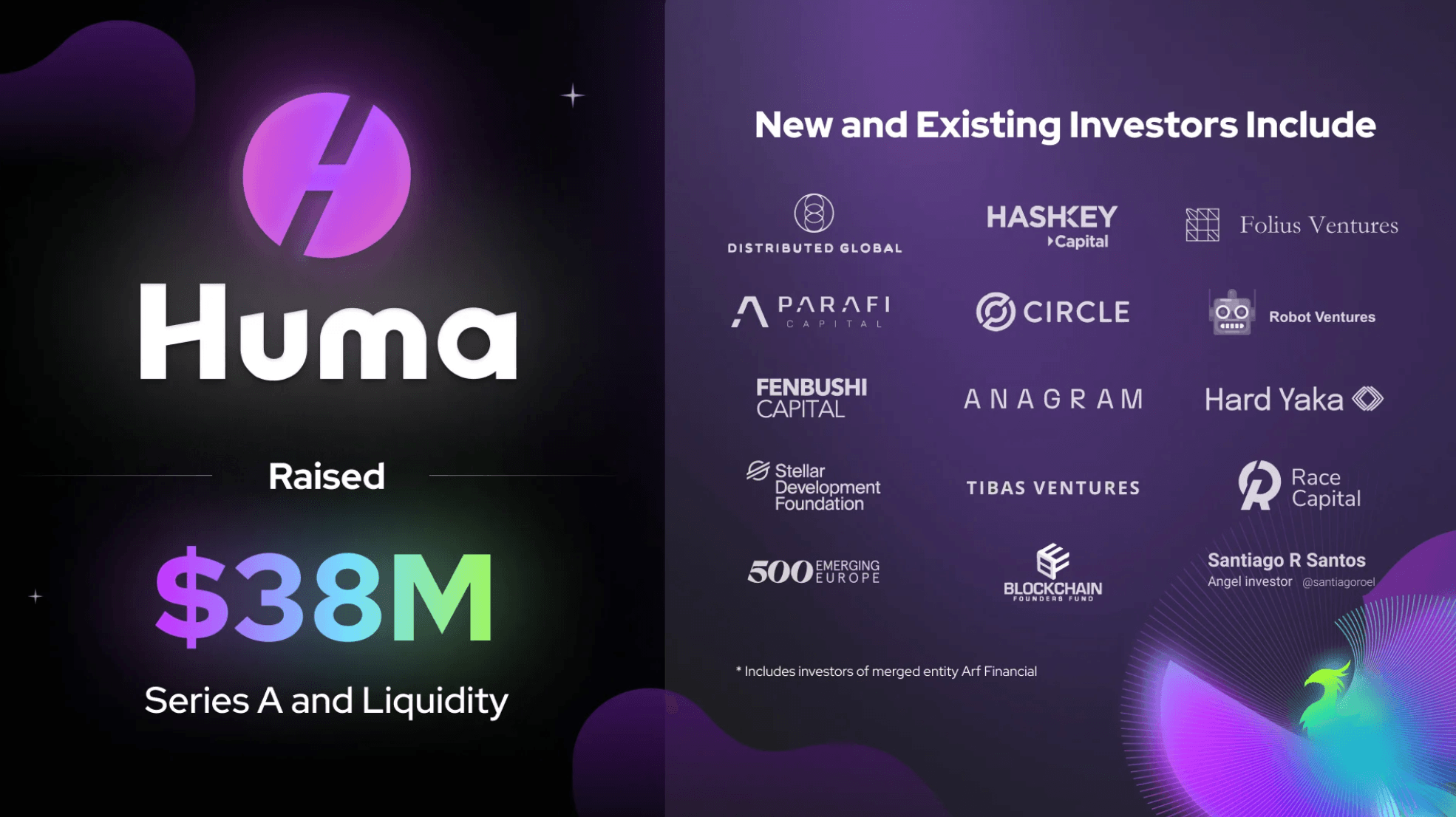Huma Finance is at the forefront of the Payment Finance (PayFi) sector, connecting traditional finance with decentralized finance (DeFi). Through its innovative PayFi Stack and the native token $HUMA, Huma seeks to provide real yield opportunities, enhance global payment infrastructure, and build a sustainable and community-driven ecosystem.
Phemex will list HUMA soon and launch related promotions — stay tuned for more updates!
Summary Box (Quick Information)
Ticker Symbol: HUMA
Blockchain: Solana
Contract Address: HUMA1821qVDKta3u2ovmfDQeW2fSQouSKE8fkF44wvGw
Circulating Supply: 1.73B HUMA
Max Supply: 10B HUMA
Primary Use Case: Payment financing and decentralized credit infrastructure
Current Market Cap: $127.3 million
Availability on Phemex: Coming soon
❓ What is Huma Finance (HUMA)?
HUMA explained: the future of Payment Financing
In the dynamic world of decentralized finance (DeFi), Huma Finance emerges as a pioneer by introducing the concept of Payment Finance (PayFi).
Fundamentally, Huma is a decentralized protocol designed to revolutionize funding, settlement, and management of global payments. Utilizing blockchain technology, Huma aims to provide instant access to liquidity, enabling international transactions without the typical delays and capital locks of traditional financial systems.
The native token of the ecosystem, $HUMA, plays a central role in various network operations, including staking, governance, and rewards for liquidity providers.
Platform Metrics
By May 2025, Huma Finance achieved significant milestones:
Total transaction volume: over $4.4 billion
Total revenue: approximately $4.10 million
Feather Points distributed: about 611 million
Active liquidity assets: approximately $103 million
PayFi Assets: about $66.24 million
Liquidity Assets: approximately $37.73 million

How many HUMA are there?
The total and maximum supply of $HUMA is 10 billion tokens. The initial circulating supply is approximately 1.73 billion tokens, representing 17.33% of the total supply.
Token distribution:
Liquidity Providers and Ecosystem Incentives (31%): rewards for those contributing liquidity and growth to the protocol
Investors (20.6%): allocated for seed and Series A investors with multi-year vesting periods
Team and Advisors (19.3%): reserved for key contributors and advisors (also subject to vesting)
Protocol Treasury (11.1%): funding for future development, grants, and partnerships
CEX Listings and Marketing (7%): intended to secure listings on exchanges and execute marketing campaigns
Initial airdrop (5%): rewards for early users and contributors
Market Maker and On-Chain Liquidity (4%): ensures token stability and liquidity
Pre-Sales (2%): allocated for early supporters of the development

Vesting Schedule:
Team & Advisors / Investors: 12 months lock-up, followed by linear quarterly releases over three years
LP and Ecosystem Allocations: deflationary quarterly releases with a decay rate of 7%, adjustable by governance
Protocol Treasury: 1% unlocked at TGE, the remainder distributed in eight quarterly releases
Details of the Season 1 Airdrop
The Season 1 Airdrop allocates 5% of the total HUMA supply to early adopters, distributed as follows:
65% for Liquidity Providers (LPs): rewards proportional to the Feathers earned in the snapshot
25% for Ecosystem Partners: allocated based on the volume of facilitated transactions and the revenues generated for the protocol
10% for Community Engagement: for content creators, active participants in social campaigns, and contributors to the development and security of the protocol
What does HUMA do?
The Huma token is the backbone of the Huma ecosystem, with multiple utilities:
Governance: holders can stake HUMA to participate in the governance of the protocol and vote on decisions such as liquidity allocation, parameters, and incentive distribution
LP and Ecosystem Rewards: HUMA rewards LPs, ecosystem partners, and community members based on their capital commitment, time of participation, and engagement
Value Accrual Mechanisms: the Huma Foundation is exploring sustainable ways to utilize the protocol's revenue to strengthen the PayFi movement and promote shared prosperity
Ecosystem Currency: although stablecoins remain the primary means for transactions in the real world, HUMA will enable advanced protocol features, such as real-time redemptions in the future.
The technology behind HUMA
Huma 2.0: Real Yield permissionless on Solana
Huma 2.0 is a permissionless, compliant, and composable yield platform built on Solana, allowing access to stable real yields in double digits generated by real Payment Financing activities.
Key features:
Classic Mode: stable real yield of double digits (currently 10.5% APY in USDC) + basic Feathers
Maxi Mode: to maximize Feathers, up to 25x during the launch promotion
Flexibility: LPs can switch between modes at any time, only paying gas fees
Optional lock-ups: 3 or 6-month locks significantly increase Feathers multipliers
$PST (PayFi Strategy Token): liquid and yield-bearing LP token, designed for composability in DeFi on Solana
Integration partners:
Jupiter: enables instant swap of $PST for USDC
Kamino: enables USDC loans with $PST as collateral, facilitating yield-maximizing strategies
RateX: supports splitting $PST for leveraged YT/PT strategies
Referral system:
Users can earn 10% of the Feathers collected by referred friends for one year, encouraging community growth and engagement.
The PayFi Stack and its components
The Huma PayFi Stack is a six-layer framework designed to optimize payment financing with blockchain:
Transaction Layer: utilizes fast and low-cost blockchains, such as Solana and Stellar
Currency Layer: incorporates stablecoins and yield-bearing currencies for stable and compliant payments
Custody Layer: advanced MPC solutions and smart contracts for secure asset ownership and real-time settlements
Compliance Layer: integrates global regulations with on-chain identity to ensure regulatory compliance
Financing Layer: connects capital and demand through tokenized assets and on-chain risk management
Application Layer: provides infrastructure for building intuitive and compliant financial applications
Team and Origins
Huma Finance was co-founded by Erbil Karaman and Richard Liu, both with extensive experience in technology and finance. Karaman worked at major tech companies, while Liu has a background in engineering and venture capital.
Partnerships and Funding
The project has received support from heavyweight investors, including Circle and Hashkey Capital.
Huma secured significant investments to support its vision:
February 2023: $8.3 million in the Seed round
September 2024: $38 million in the Series A round

Collaboration with Jupiter:
Pre-Sale for JUP Stakers: 1% of the total supply at a FDV of $75 million, with a 3-month lock-up after TGE
Treasury Swap: mutual treasury swap worth $250,000 at the same FDV, with a 1-year lock-up
Community Collaboration: mobilization of the Jupiter community for memes and content promoting the launch of $HUMA
Key news and events
May 2025: announcement of listings on CEXs, trading starting on May 26
May 2025: partnership with Visa to enhance real-time payment systems via blockchain
April 2025: launch of Huma 2.0 on Solana, bringing composable Real Yield to DeFi users
March 2025: completion of a $46 million funding round, demonstrating strong investor interest
February 2025: integration with major payment platforms, expanding the reach and utility of the Huma ecosystem
Is HUMA a good investment?
This is not financial advice.
HUMA represents an attractive opportunity for those interested in the intersection of traditional finance and blockchain technology.
Pros:
Robust use case for Payment Financing
Experienced team with a clear vision
Support from strategic partners and investors
Risks:
Market volatility inherent to cryptocurrencies
Regulatory uncertainties in the DeFi environment
It is essential to conduct your own research and consider your risk tolerance before investing in HUMA.
To find out how to buy HUMA, trade HUMA, and follow the latest news, visit Phemex and explore the available resources.
Conclusion
Huma Finance (HUMA) is positioned to have a significant impact on the DeFi landscape, offering Payment Financing solutions that bridge traditional finance and blockchain technology.
With the upcoming listing on Phemex and the launch of Season 1 Airdrop, Huma is actively engaging its early adopters and contributors.
The allocation of 5% of the total supply for Liquidity Providers, Ecosystem Partners, and community members demonstrates the project's commitment to rewarding its early supporters.
Huma Finance will continue to develop and expand its ecosystem, offering promising opportunities for those interested in the DeFi world.



